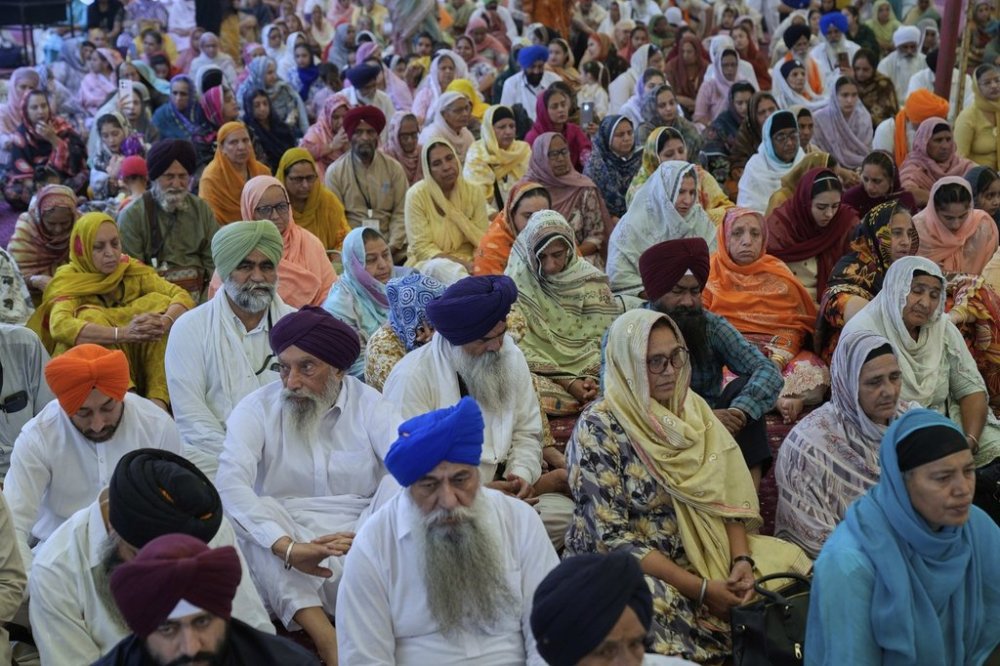Thousands of Sikh pilgrims visit Pakistan to celebrate Vaisakhi festival
Advertisement
Read this article for free:
or
Already have an account? Log in here »
To continue reading, please subscribe:
Monthly Digital Subscription
$1 per week for 24 weeks*
- Enjoy unlimited reading on winnipegfreepress.com
- Read the E-Edition, our digital replica newspaper
- Access News Break, our award-winning app
- Play interactive puzzles
*Billed as $4.00 plus GST every four weeks. After 24 weeks, price increases to the regular rate of $19.00 plus GST every four weeks. Offer available to new and qualified returning subscribers only. Cancel any time.
Monthly Digital Subscription
$4.75/week*
- Enjoy unlimited reading on winnipegfreepress.com
- Read the E-Edition, our digital replica newspaper
- Access News Break, our award-winning app
- Play interactive puzzles
*Billed as $19 plus GST every four weeks. Cancel any time.
To continue reading, please subscribe:
Add Free Press access to your Brandon Sun subscription for only an additional
$1 for the first 4 weeks*
*Your next subscription payment will increase by $1.00 and you will be charged $16.99 plus GST for four weeks. After four weeks, your payment will increase to $23.99 plus GST every four weeks.
Read unlimited articles for free today:
or
Already have an account? Log in here »
Hey there, time traveller!
This article was published 14/04/2025 (197 days ago), so information in it may no longer be current.
NANKANA SAHIB, Pakistan (AP) — Thousands of Sikhs were in Pakistan on Monday to celebrate Vaisakhi, a harvest festival that marks the start of the Sikh New Year and is mostly observed in Punjab and northern India.
Pakistani authorities this year granted more than 6,500 visas to Indian Sikhs, a higher number than previous years. Visas to travel between the two countries are normally difficult to obtain, but the governments have a special arrangement that allows pilgrims to visit shrines and places of worship.
The main Vaisakhi ceremony was held in Nankana Sahib, where the founder of the Sikh faith, Guru Nanak, was born.

Gurdwara Janam Asthan is one of nine Sikh places of worship at Nankana Sahib, which is located some 75 kilometers (46 miles) west of Lahore.
Rinko Kaur traveled from India’s western Gujarat state, where Prime Minister Narendra Modi is from. She said she was initially hesitant about visiting Pakistan.
“My family warned me about going … and said I should be with a group to be safe,” Kaur said.
But she said the people have been welcoming.
“I saw people coming out of their houses, waving as a welcome gesture. We feel as if we are celebrities,” said Kaur, who plans to visit other Sikh holy sites in Pakistan in the coming days.
Many Sikh holy sites are located in Pakistan after the British partitioned the subcontinent into separate nations in 1947 following two centuries of colonial rule.
Pakistani Prime Minister Shehbaz Sharif said Vaisakhi was a time of “great joy for farmers.” The festival also encourages a spirit of hope, unity and renewal that inspires and unites communities, Sharif added.
The Free Press acknowledges the financial support it receives from members of the city’s faith community, which makes our coverage of religion possible.


